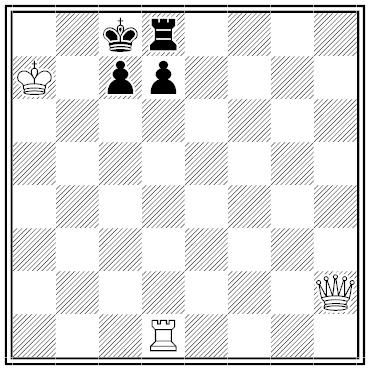
Future world chess champion Max Euwe composed this miniature in 1927. White to mate in two moves.

Future world chess champion Max Euwe composed this miniature in 1927. White to mate in two moves.
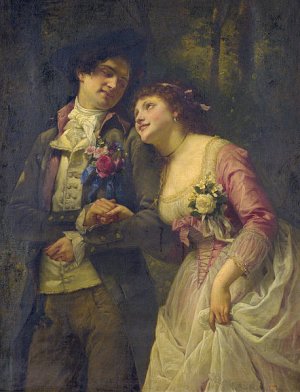
belgard
n. a sweet or loving look
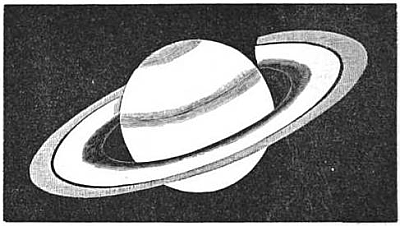
An astronomical oddity, from the Sidereal Messenger, June 1890:
On the evening of April 25th, 1889, at about 8:30 p.m., I was examining Saturn with a power of about 180 on a 4 1/8-inch achromatic by Brashear, when, much to my surprise, I found the shadow of the globe on the rings curved the wrong way, i.e. from the globe, as shown in the following drawing. Thinking my eyes might be deceiving me I called my wife, and without telling her what I had seen, requested her to describe the shape of the shadow. She described the shadow as having its right hand edge curved away from the planet.
I wrote to Professor Comstock of the Washburn Observatory about it, and was informed by him that while my observation of Saturn was unusual, it was far from being unprecedented; that the same appearance was observed in 1875 with the 26-inch achromatic at Washington, and that Webb, in ‘Celestial Objects for Common Telescopes,’ says: ‘The outline of this shadow has often been found curved the wrong way for its perspective.’ Professor Comstock also adds, ‘I do not know that any satisfactory explanation for this anomaly has ever been given.’
William Corliss notes a flurry of similar observations between 1886 and 1914. I think this must have been explained by now, but I haven’t been able to find a source.
(Jenks, Aldro; “On the Reversed Curvature of the Shadow on Saturn’s Rings,” Sidereal Messenger, 9:255, 1890.)
You have 100 coins totaling $5.00. They consist of pennies, dimes, and half dollars. How many of each are there?

Helen Thomas’ husband departs for war, 1917:
After breakfast, while he showed me where his account books were and what each was for, I listened calmly, and unbelievingly he kissed me when I said I, too, would keep accounts. ‘And here are my poems. I’ve copied them all out in this book for you, and the last of all is for you. I wrote it last night, but don’t read it now … It’s still freezing. The ground is like iron, and more snow has fallen. The children will come to the station with me; and now I must be off.’
We were alone in my room. He took me in his arms, holding me tightly to him, his face white, his eyes full of a fear I had never seen before. My arms were round his neck. ‘Beloved, I love you,’ was all I could say. ‘Jenny, Jenny, Jenny,’ he said, ‘remember that, whatever happens, all is well between us for ever and ever.’ And hand in hand we went downstairs and out to the children, who were playing in the snow.
A thick mist hung everywhere, and there was no sound except, far away in the valley, a train shunting. I stood at the gate watching him go; he turned back to wave until the mist and the hill hid him. I heard his old call coming up to me: ‘Coo-ee!’ he called. ‘Coo-ee!’ I answered, keeping my voice strong to call again. Again through the muffled air came his ‘Coo-ee’. And again went my answer like an echo. ‘Coo-ee’ came fainter next time with the hill between us, but my ‘Coo-ee’ went out of my lungs strong to pierce to him as he strode away from me. ‘Coo-ee!’ So faint now, it might be only my own call flung back from the thick air and muffling snow. I put my hands up to my mouth to make a trumpet, but no sound came. Panic seized me, and I ran through the mist and the snow to the top of the hill, and stood there a moment dumbly, with straining eyes and ears. There was nothing but the mist and the snow and the silence of death.
Then with leaden feet which stumbled in a sudden darkness that overwhelmed me I groped my way back to the empty house.
He was killed shortly after arriving in France. From her memoir World Without End, 1931.
Deluged with mail after his discovery of the double helix, Francis Crick began sending a printed card in response to invitations:

He modeled it on a similar one made by Edmund Wilson:
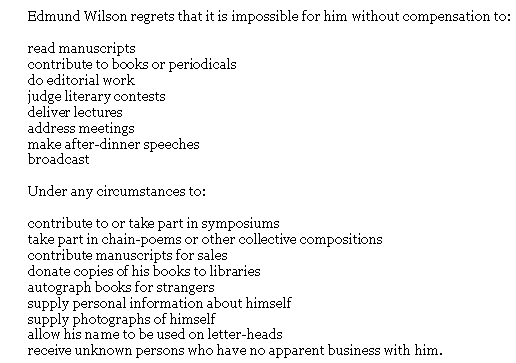
In 1976 freelance writer Betty Eppes managed to talk to J.D. Salinger for 20 minutes. “He said he didn’t believe in giving autographs. It was a meaningless gesture. He told me never to sign my name for anyone else. It was all right for actors and actresses to sign their names, because all they had to give were their faces and names. But it was different with writers. They had their work to give. Therefore, it was cheap to give autographs. He said, Don’t you ever do it! No self-respecting writer should ever do it.”
See Pen Fatigue.
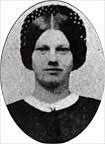
On July 3, 1863, 20-year-old Pennsylvania seamstress Ginnie Wade was kneading dough in her sister’s kitchen when a bullet pierced the door behind her and passed through her heart, killing her instantly.
She was the only civilian casualty of the Battle of Gettysburg.
Motto heartening, inspiring,
Framed above my pretty desk,
Never Shelley, Keats, or Byring
Penned a phrase so picturesque!
But in me no inspiration
Rides my low and prosy brow —
All I think of is vacation
When I see that lucubration:
![]()
When I see another sentence
Framed upon a brother’s wall,
Resolution and repentance
Do not flood o’er me at all
As I read that nugatory
Counsel written years ago,
Only when one comes to borry
Do I heed that ancient story:
![]()
Mottoes flat and mottoes silly,
Proverbs void of point or wit,
“KEEP A-PLUGGIN’ WHEN IT’S HILLY!”
“LIFE’S A TIGER: CONQUER IT!”
Office mottoes make me weary
And of all the bromide bunch
There is only one I seri-
Ously like, and that’s the cheery:
![]()
— Franklin Pierce Adams, Tobogganning on Parnassus, 1913
In 1946 an American doctor named Jones was tried in Ohio for performing six illegal abortions (State v. Jones, 80 Ohio App. 269). In one of the six cases, the only evidence was the testimony of the woman herself, Jacquelin Harris. But under Ohio law, the recipient of an abortion was an accomplice to the crime, and the unsupported testimony of an accomplice was suspect and insufficient for a conviction.
This means trouble:
“This puts the jury in a position of returning a self-annulling verdict,” writes Peter Suber in The Paradox of Self-Amendment. “If they find Jones guilty, then they must find that Harris was his accomplice, then they must find her evidence against Jones insufficient, then they must acquit Jones. But if they find Jones innocent, then they must (at least may) find Harris’ evidence legally sufficient, then they must (at least may) convict Jones.”
Jones was found guilty, ironically because, as an accused party, he was presumed innocent, and so the witness was presumed not to be an accomplice. “This led to the remarkable situation that the testimony was admissible and could lead to a conviction,” writes Michael Clark in Paradoxes From A to Z, “notwithstanding the fact that the conviction undermined the probative value of the testimony.”
See Turnabout.